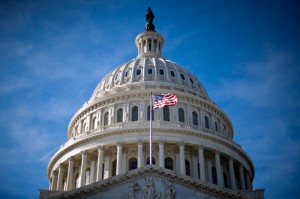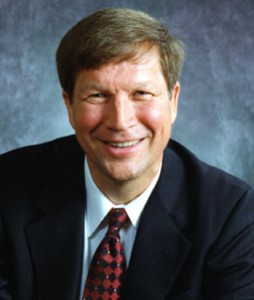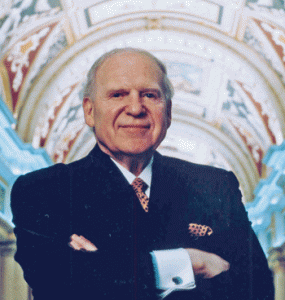One of the many first-ever things that Geoff Freeman has done to remake the American Gaming Association in his image is compile a voting guide  for industry workers, walking them through the primary and caucus processes in their states, and providing a rundown on where the candidates stand on gaming. Fortunately, gaming policy is largely an intrastate game of political football in which Washington, D.C., cannot intervene. However, tribal casinos and Internet gambling are very much at the mercy of whoever is in power in Foggy Bottom. For instance, federal attitudes towards tribal gaming have been far more expansive during the Obama administration than they were under Bush II, including the scrapping of a proposed rollback of Class II gaming — so tribes like the Mashpee Wampanaog and Tohono O’odham know where to send their ‘thank-you’ notes.
for industry workers, walking them through the primary and caucus processes in their states, and providing a rundown on where the candidates stand on gaming. Fortunately, gaming policy is largely an intrastate game of political football in which Washington, D.C., cannot intervene. However, tribal casinos and Internet gambling are very much at the mercy of whoever is in power in Foggy Bottom. For instance, federal attitudes towards tribal gaming have been far more expansive during the Obama administration than they were under Bush II, including the scrapping of a proposed rollback of Class II gaming — so tribes like the Mashpee Wampanaog and Tohono O’odham know where to send their ‘thank-you’ notes.
But I digress. You can read the AGA report here, so I’ll just note some of the highlights. Candidates’ attitudes towards casinos range from the scorched-earth negativity (“I hate gambling”) of Jeb Bush, who would  even begrudge Native Americans their gaming halls, to one who holds 10% of a casino company in his stock portfolio (Donald Trump). Then there’s Hillary Clinton, who went from opposition in 1984 to support in 2014. (John Kasich, right, did a similar pivot over a three-year period.) For Hamlet-like self-examination, you have Martin O’Malley, the father of Maryland‘s casino industry who simultaneously decried it as “morally bankrupt.” Marco Rubio is his GOP echo, calling gambling “morally indefensible” and using the Nevada economy to illustrate his point. The stealth candidate is Bernie Sanders, who has no recorded views on the subject. The remainder of the presidential contestants gracefully sidestep it, either implying (Ted Cruz) or outright saying (Ben Carson) that it’s a state-level matter. Even though it’s not likely to make Bush any new friends in the gaming industry, it’s hard to say what impact the Freeman report will have.
even begrudge Native Americans their gaming halls, to one who holds 10% of a casino company in his stock portfolio (Donald Trump). Then there’s Hillary Clinton, who went from opposition in 1984 to support in 2014. (John Kasich, right, did a similar pivot over a three-year period.) For Hamlet-like self-examination, you have Martin O’Malley, the father of Maryland‘s casino industry who simultaneously decried it as “morally bankrupt.” Marco Rubio is his GOP echo, calling gambling “morally indefensible” and using the Nevada economy to illustrate his point. The stealth candidate is Bernie Sanders, who has no recorded views on the subject. The remainder of the presidential contestants gracefully sidestep it, either implying (Ted Cruz) or outright saying (Ben Carson) that it’s a state-level matter. Even though it’s not likely to make Bush any new friends in the gaming industry, it’s hard to say what impact the Freeman report will have.
* If Sheldon Adelson was in the headlines today, it was not as a political player but for having delivered 4Q15 numbers at Las Vegas Sands that had Wall Street pleasantly surprised. Sands China exceeded one analyst’s expectations by dint of workforce cuts and lower  marketing costs. Noting 22% room-revenue growth, J.P. Morgan analyst Joseph Greff called Strip results “solid,” adding that his outlook for 2016 was “bullish.” Mass-market gambling profitability in Macao improved, which was good given than room revenues were off 21% and retail was down 8%. The cost-cutting also had to offset 38% less credit extended by junket operators to VIPs, 18% less slot revenue and other bummers. “Uncertainty still lingers, and we have limited visibility on less negative or marginally positive trend changes.” Greff concluded. On the sunny side, net revenues in Las Vegas were up 10%. It’s a good day when you can report lower profits and revenues and still get plaudits from The Street.
marketing costs. Noting 22% room-revenue growth, J.P. Morgan analyst Joseph Greff called Strip results “solid,” adding that his outlook for 2016 was “bullish.” Mass-market gambling profitability in Macao improved, which was good given than room revenues were off 21% and retail was down 8%. The cost-cutting also had to offset 38% less credit extended by junket operators to VIPs, 18% less slot revenue and other bummers. “Uncertainty still lingers, and we have limited visibility on less negative or marginally positive trend changes.” Greff concluded. On the sunny side, net revenues in Las Vegas were up 10%. It’s a good day when you can report lower profits and revenues and still get plaudits from The Street.
Over at Deutsche Bank, analyst Carlo Santarelli called the Sands numbers “good enough,” including a 16% increase in slot coin-in at Venetian and Palazzo. Macanese results exceeded his forecast, which he deemed “broadly encouraging.” As for Sheldon, well, he’s busy trying to build a stadium that would bring the Oakland Raiders to Las Vegas. See, I told you Sheldon was behind that rumored mega-stadium concept. He’s also coveting a northern New Jersey casino resort (nice knowing you, Sands Bethlehem) and, although some analysts don’t expect his Parisian to open until early 2017, he’s hinting at a partial, hemi-demi-semi-opening somewhere around the middle of this year.

